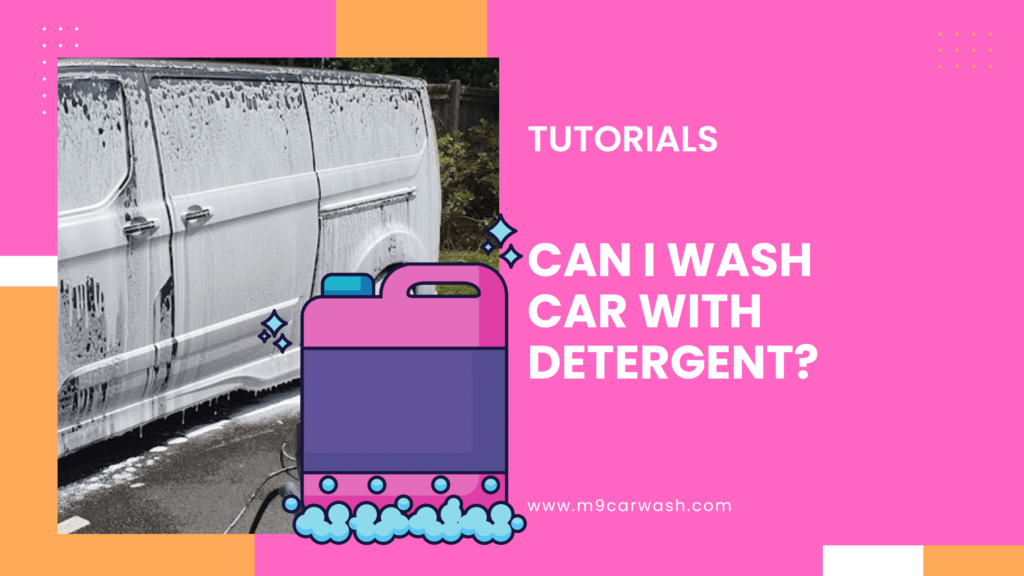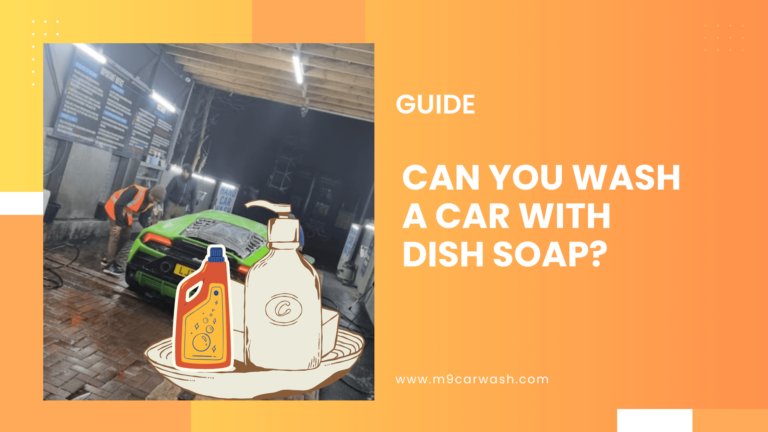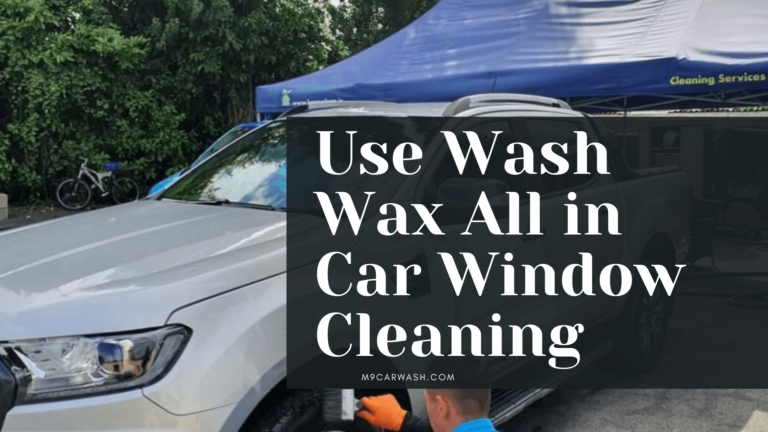No, It’s not recommended to wash your car with laundry detergent. Laundry detergents are too harsh for car paint and can strip away wax, damage the clear coat, and leave residues. Instead, use a car-specific soap that is designed to clean without harming the finish.
Car wash soaps are designed specifically for vehicles, offering benefits that household detergents often lack.

Homemade Alternatives to Detergent
Here are 3 homemade alternatives to commercial car wash soaps:
1. Baking Soda and Dish Soap
- Ingredients:
- 1/4 cup baking soda
- 1/4 cup mild dish soap (without bleach)
- 1 bucket of warm water
- Instructions:
- Mix the baking soda and dish soap in the bucket of warm water. Stir until fully dissolved.
- Use this solution to gently wash your car, then rinse thoroughly with water.
2. White Vinegar and Water Solution
- Ingredients:
- 1 cup white vinegar
- 1 bucket of water
- Instructions:
- Mix white vinegar with water in a bucket.
- Use this solution for a gentle clean that helps remove water spots. Rinse with plain water afterward.
3. Castile Soap and Water
- Ingredients:
- 1/4 cup liquid Castile soap
- 1 bucket of water
- Instructions:
- Combine Castile soap with water in a bucket.
- Use a soft sponge or cloth to wash your car, then rinse thoroughly. This gentle soap is biodegradable and safe for car surfaces.
Differences Between Car Soap and Laundry Detergent
Car wash soap is specially formulated to clean vehicles without damaging the finish. It creates a lot of suds, which helps lift dirt without scratching the surface.
On the other hand, laundry detergent can be too harsh. It contains chemicals that might strip away protective layers, such as a clear coat and protective wax.
If you use laundry detergent, you risk dulling your paint and causing long-term damage.
For the best results, I recommend using proper car wash soap instead.
Do Chemicals Have any Impact on Car Surfaces?
The chemicals in household soaps may not be safe for car surfaces. Many household products contain harsh ingredients that can erode the clear coat over time. This coat is essential for protecting the paint beneath.
Using a car wash soap helps avoid this damage. Car soaps often contain gentle surfactants and additives designed to clean without harm. They maintain shine and protect the car’s finish for longer.
Surfactants and Additives
Surfactants play an important role in car wash soaps. They help create foam and lift dirt away from surfaces.
This makes washing more effective while reducing scratches.
Some car soaps include additional additives that provide extra benefits. For example, some add shine or protect your car from the elements.
pH Levels and Car Paint Protection
The pH level of a car wash soap is crucial. A product with a balanced pH is safer for paint surfaces. It cleans without causing harm to the clear coat, which is vital for paint protection.
Most quality car wash soaps are pH-balanced. This reduces the risk of creating issues like fading or discoloration. It’s best to avoid any soap that is not labeled as pH-balanced.
Best Practices for Washing Your Car
Washing your car doesn’t have to be complicated. With the right tools and techniques, you can protect your vehicle’s finish and ensure it looks great.
Step 1: Grab your Tools and Products
Picking the right tools is essential for an effective car wash. First, I recommend using a dedicated car wash soap instead of laundry detergent.
Car wash soaps are designed to be gentle on your vehicle’s paint while still cleaning effectively.
For sponges, consider using a microfiber wash mitt. Unlike regular sponges, these are less likely to cause swirl marks and they hold more soap and water.
Don’t forget to get a separate wheel cleaner, which helps remove grime and brake dust. Using a foam cannon can also create a thick layer of soap that clings to the surface, making the wash easier.
Step 2: Techniques for Avoiding Damage During Washing
When washing my car, I take care to avoid damage.
I start with the wheels, as they tend to be the dirtiest part. I use a separate sponge for them to avoid transferring dirt to the paint.
When applying soap, work from the top down.
This way, any loose dirt flows down and doesn’t scratch the paint. Always rinse your sponge frequently to remove debris. I also recommend using straight strokes rather than circular movements to prevent swirl marks.
If you notice stubborn spots, a little extra lubrication can go a long way.
A quick spritz of water can help lift dirt without more elbow grease. This method also protects against scratches.
Step 3: Rinse and Drying for a Spotless Finish
Proper rinsing and drying are crucial for that spotless finish.
I make sure to rinse my car thoroughly while avoiding direct sunlight, which can cause streaks. A pressure washer can be helpful here, allowing for a deeper clean.
After rinsing, use a microfiber drying towel. Lightly blot rather than wipe to avoid scratching the surface. Pay special attention to areas where water tends to collect, like around mirrors and emblems.
For the final touches, I often use a glass cleaner for windows to ensure no streaks remain.
Can you use household items as a detergent Alternative?
Using household items to wash your car can be fast and budget-friendly.
Dish soap is popular, but it’s important to avoid options that contain bleach or phosphates, as they can damage your car’s paint.
A simple mix of warm water with a few drops of dish soap works well for light dirt.
I’ve also used shampoo in a pinch. It can create a nice lather that removes grime, though it may not be as effective on tough stains.
Another go-to is hand soap, which is gentle on the paint and can be used for regular washes.
Best practices include rinsing the car first and using a soft sponge to apply the solution. This minimizes scratching and ensures a good clean.
Remember to avoid using harsh chemicals that can dull the finish.
Comparing Costs of Car Washing Options
The cost of car washing can vary greatly. When I use commercial car wash soaps like Meguiar’s Gold Class or Adam’s Car Wash Shampoo, prices usually range from $10 to $20 for a bottle. These products often produce thick suds and work well with a foam gun for a deeper clean.
In comparison, using household items can cost you less than a dollar. For instance, buying a bottle of dish soap is roughly $3, and it lasts for several washes.
| Option | Cost Range |
|---|---|
| Household Items (Dish Soap) | $0.50 – $3 |
| Commercial Car Wash Soap | $10 – $20 |
| Professional Car Wash Service | $15 – $50+ |
What are the potential effects of using laundry detergent on a car’s paint?
Using laundry detergent can lead to several issues with a car’s paint.
Many detergents contain strong chemicals that may strip protective wax or clear coat layers.
This can cause dullness, discoloration, or even rust over time, especially if used frequently.
Is it safe to mix vinegar with laundry detergent to wash a car?
Mixing vinegar with laundry detergent is not recommended. Vinegar is acidic, and it can interact with the chemicals in the detergent, which may create unwanted effects on your car’s paint.
Can I substitute dish soap or hand soap for car wash soap?
While you might be tempted to use dish soap or hand soap, it’s not a good idea. These soaps are often too harsh and can strip the wax from your car.
They may also leave residues that attract dirt instead of protecting your paint.
A safe home remedy for washing cars includes mixing a few drops of mild dish soap with water. This mixture can help clean your car without damaging the paint.
Just remember to rinse thoroughly to remove any soap residue.
How does laundry detergent compare to specialized car wash products?
Specialized car wash products are designed to be gentle on car surfaces. They often have added ingredients to protect the paint and wax.
In contrast, laundry detergent may not provide these benefits and can harm your car’s finish over time.
Are there household products that can be recommended for car washing?
Yes, there are a few household products that can work well. A mild dish soap solution is one option. Another is using a mix of water and vinegar for cleaning windows.
Ensure that whatever you use won’t harm the paint or leave residues.






